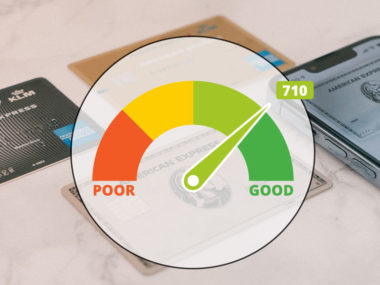
Table of Contents
What Goes Into Your Credit Score
There are three credit bureaus — Experian, Equifax, and TransUnion — that each independently calculate your credit score. Your score — often referred to as a FICO score (Fair, Isaac, and Co.) — is made up from a few factors.
Here’s a quick, generalized breakdown based on the widely used FICO model:
- 35%: Payment history — How have you paid back your lines of credit?
- 30%: The amount you owe on credit and your total debt
- 15%: Average ages of your credit history
- 10%: New credit
- 10%: The types of credit utilized
It’s important to note that the scores reported from each of the bureaus are unlikely to be exactly the same. The numbers above are generalized, but should give you a sense of how the bureaus arrive at your score.
What Affects Your Credit Score?
There is more to your credit score than the FICO formula. Let’s look at some of the specific situations that impact your credit.
Lines of Credit
How many lines of credit, or “tradelines,” do you have, and how many different types? Bank credit cards, store accounts, loans (including car loans, mortgages, and student loans) are all pieces of this element of credit. Showing creditors that you can handle a variety of account types — and more importantly, make payments on those accounts on time — positively affects your score. Bear in mind you don’t want too many accounts total — but you want a variety of types.
New Accounts
Opening too many new accounts too quickly will negatively impact your credit score. It looks fishy to creditors, who then wonder why you would need that much credit in a short time — and whether you intend to pay back the credit.
Utilization Ratio
How much of your credit you utilize can either negatively or positively impact your score, and is one of the fastest ways to change your score for the better. Luckily, unlike many other negative components of your credit score, this impact clears up in just a few months — typically about 3. If you start paying off your credit cards, you can often quickly raise your credit score. The ideal utilization ratio is 30 percent or less of your credit limit per account.
For example, your credit card has a $4,000 credit limit. You currently have a $3,000 balance on the card — below the limit, but with a utilization of 75 percent. This is negatively affecting your credit. But, this is only reported once per month to the credit bureaus. In other words, if you have $3,000 on your account, but pay off $2,000 before the report is sent, your utilization will only show 25 percent for the month — reflecting positively on your credit score. If, instead, you let the $3,000 continually roll over, you will take a hit to your score, but not face ongoing penalties unless your percentage continually rises.
Average Credit Age
Continuing from our last example, your credit card — one of the first you opened — has $1,000 on the account, and the card carries yearly fees and high interest. You make payments regularly. Why not pay it down and focus on a few other cards when you have the extra cash? The average age of all your tradelines is taken into account. If you’ve had the credit card for a number of years, closing it out when you only have new cards could negatively impact your score.
Derogatory marks
A derogatory mark can be anything from late payments to bankruptcy. Tax liens, judgments, charge-offs, and accounts that have gone to collections are also derogatory marks. While there are ways to dispute and remove the marks, if the mark is not a mistake, it will take between 7 and 10 years before it is no longer counted against your credit.
Hard and Soft Inquiries: What They Are and How They Affect Credit
There are two different types of credit checks: soft inquiries and hard inquiries. While one does not affect your credit score, the other will result in a deduction to your score — and it’s needed whenever you seek a loan.
Soft inquiries
Soft inquiries, such as your free yearly check with bureaus, do not affect credit scores. These checks can also be made without your permission, such as your current car loan lender checking on your credit score to make sure you are still loan-worthy. It’s also how you can be pre-approved for credit cards and loans. Requests related to employment and insurance also fall under this category.
Hard inquiries
Any time an inquiry is made at your request for a loan, such as for a car or mortgage, it falls under the hard inquiry category. A typical hard inquiry, according to TransUnion, can deduct 5 points from your credit score. However, if you are shopping around for a new car or comparing mortgage lenders, don’t be afraid to make multiple hard inquiries. This is seen as good financial sense, comparing options, rather than an abuse of inquiries, and will be treated as such. Hard inquiries will appear on your credit report for two years, but only impact your credit score for 12 months.
How to Rebuild Credit
If you have low credit, some easy ways to potentially quickly raise your score are correcting errors and disputing mistakes. In 2013, the Federal Trade Commission found that 5 percent of consumers had a mistake on one of the three bureau’s reports. The most common mistakes seen by the Consumer Financial Protection Bureau are identity errors, incorrect account status, data management or processing errors, and balance errors. These, in turn, lead to higher interest rates on loans, costing consumers money.
There are a variety of companies who aim to help you with disputes and repair your credit habits and score. While there are non-profit organizations, such as the National Foundation for Credit Counseling, it may be easier to instead just pay down your debt unless you suffer from complex problems. Paying down your credit — lowering your utilization ratio — remains the best and quickest way to improve your credit.
However, other situations such when fraud or identity theft have affected your score, getting help from a professional credit repair company may end up saving you time and energy disputing errors with the bureaus and getting your score fixed. It is always possible to do this yourself, but credit repair companies that specialize in this sort of thing can provide an alternative to going through the dispute process alone.
Now that you know what goes into your credit score, visit the credit score resource center for more articles and guides. Errors can also appear on your credit report, bringing down your score. Learn more about the errors, and how to dispute them, at our dispute letter resource center.
Image Source: https://depositphotos.com/






